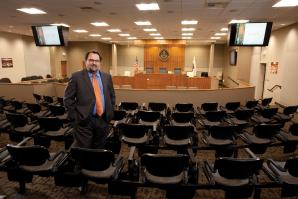And family court judges already contend with a charged atmosphere, hearing cases involving issues like domestic violence and child abuse, in addition to refereeing divorces.
To help more people afford representation, the State Bar of California is considering creating a class of licensed paralegals who could open up their own practices to offer a limited set of legal services.
Few events are as stressful as a divorce. But for many Californians who can’t afford lawyers, having to represent themselves in family court compounds their troubles.
Judge Mark Juhas, who hears family law cases in Los Angeles, tells the story of a couple that was finalizing their divorce and had prepared their own paperwork for their final court appearance. But they hadn’t filled it out properly, and the judge told them what they needed to fix. They followed his instructions and came back for a second hearing, but the documents still weren’t correct. They returned a third time, then a fourth. Finally on the fifth try, they got it right.
Between 75 and 85 percent of Californians who show up in family court represent themselves. That’s often not just time consuming and frustrating for them; self-represented litigants also cost courts time and money. And family court judges already contend with a charged atmosphere, hearing cases involving issues like domestic violence and child abuse, in addition to refereeing divorces.
To help more people afford representation, the State Bar of California is considering creating a class of licensed paralegals who could open up their own practices to offer a limited set of legal services. Currently, paralegals must work under the supervision of lawyers, no matter the service they provide.
The Bar’s idea raises scope-of-practice issues, and similar ideas have long been contentious in the medical field, pitting doctors against pharmacists and nurses. Supporters of the plan claim it would make more legal expertise available to people without deep pockets. Opponents counter that it would compromise the quality of legal advice and drive more lawyers out of business at a time when many are struggling.
The fragile bottom line
Gone are the days when a law degree automatically equated to a snazzy lifestyle. In-state tuition at public law schools rose almost seven times faster than inflation from 1985 to 2012. That has young lawyers coming out of school with big obligations — average student debt at public law schools went from just over $50,000 in 2007 to about $75,000 by 2011 and from $80,000 to $120,000 at private schools.
Meanwhile, starting salaries for lawyers dropped 15 percent from 2008 to 2012 to about $61,000. So most young lawyers can’t afford to lower their rates or take on much pro bono or nonprofit legal work.
But their would-be clients generally aren’t getting raises either, so many people still can’t afford to hire an attorney. For every legal aid lawyer in California, 9,000 clients need their services. Hiring a lawyer for a contested divorce costs the average Californian six months’ pay. Even representation for an uncontested divorce consumes one month’s pay according to advocacy group Consumers for a Responsive Legal System.
“My own opinion is that the economics of the traditional law firm, even a solo practitioner, are out of whack with the price that one would need to deliver high-quality legal services to the average person on the street,” says Joe Dunn, executive director of the California Bar. “If you accept that the legal profession is there to serve clients, we’re not serving the majority who need services.”
The paralegal experiment
To the north, Washington state is launching an effort to change
that. In 2012, the state’s Supreme Court passed a rule allowing
paralegals to open up their own practices. The first paralegals
will get their licenses later this year.
Washington’s rule sets educational and experience requirements
for licensees, requires them to carry liability insurance and
establishes rules of professional conduct, among other
regulations. They’ll be able to tackle lower-level tasks like
explaining legal proceedings to clients and outlining the
positions being presented on each side of a case. But they won’t
be allowed to represent clients in court or negotiate with
opposing counsel. The new rule applies only to family law, but
could eventually cover housing, immigration and elder law,
too.
A similar system has been operating in Ontario, Canada, since 2007. There are now about 5,000 licensed paralegals in that province. Ontario’s licensees have a wider scope of practice and can represent clients in cases involving small claims, traffic offenses, landlord/tenant law and minor criminal offenses.
The proposal being considered by the California Bar is still undefined but could fall somewhere in between. It might allow licensed paralegals to represent clients, says Dunn. That was the preference of the Bar’s working group that recommended serious consideration of the licensing idea. But like Washington state, licensees would be confined to working in family law, at least at first.
But would it work?
The California Bar’s consideration of the concept has divided California’s legal community. “We did receive a lot of angry emails from lawyers,” Dunn says. He wasn’t surprised. Opposition was also fierce within the Washington State Bar Association, whose board voted down the idea of licensing paralegals in both 2006 and 2008.
Some critics say licensing paralegals won’t solve the deeper issues of the sometimes-contentious family court process. Estate planning attorney Joan Medeiros of Sacramento argues that, in divorce cases, the Bar should focus on changing the process itself rather than tinkering around the edges. “It’s a crazy system, very punitive,” she says. The Bar should work on creating a “saner process” for dissolution of marriages that doesn’t require everybody to lawyer up, she says.
Andrew Cain, executive chair of the Bar’s Family Law Section, takes a middle ground. He agrees that there’s a huge gap in access to attorneys, but he wouldn’t want to see non-lawyers actually representing clients in court. The financial ramifications of mistakes are too great, he argues. At a minimum, the Family Law Section would want to see strict education, experience and supervision requirements, along the lines of Washington state’s system, he says.
Other opponents argue that broadening the market would drive even more young, rural and less affluent solo practitioners out of business. “I keep having to lower my fees to deal with so much competition, especially from paralegals, legal document preparers, bankruptcy petition preparers and unlawful detainer assistants,” wrote one young San Diego attorney in response to the Bar’s request for comments. “I was recently named one of San Diego’s top young attorneys, but I can barely afford rent.”
But Paula Littlewood, executive director of the Washington State Bar, contends that licensed paralegals by definition will be doing work that current lawyers are not. As in California, 85 percent of lower- and middle-income clients in Washington (meaning a family of four earning less than $92,000 a year) are going without representation, she says. “If a legal technician charges what a lawyer does, then people will go to the lawyer,” she contends.
Some who oppose the proposal argue whether licensed paralegals will actually be able to offer services for much less money since they will have some of the same overhead costs as lawyers, including insurance, advertising and office space. No formal study comparing rates has been done in Ontario, according to Roy Thomas of Ontario’s Law Society of Upper Canada, which administers the province’s program. But based on what’s shared anecdotally, he says, licensed paralegals are charging about half of what lawyers do.
The benefit to business
If California does go the way of Washington and Canada, it could benefit a limited number of businesses. Melanee Cottrill, board president of the Sacramento Valley Paralegal Association, works in a law firm specializing in business improvement districts. She provides services to nonprofits and says she could offer the same services, like drafting corporate organizing documents, to for-profit startups for less money than a lawyer would charge.
And if Washington state’s proposal is expanded to include housing law, licensed paralegals could be useful to small landlords. Those owners sometimes try to handle evictions themselves because they can’t afford lawyers, but they could benefit from help navigating those and other legal problems, says Christopher Benis, a lawyer and landlord who advises the Rental Housing Association of Puget Sound in Seattle. He favors the proposal as long as there are “clear sideboards” on what licensed paralegals can do.
Roger Niello of the Sacramento Metro Chamber responded cautiously to news about the idea, since scope-of-practice issues are so controversial. The quality of legal services provided is important, and he says he would want input from the Chamber’s legal community before the organization took a position.
With or without business leaders’ support, the idea has a long way to go. It next will appear on the agenda of a California Bar study group that this spring will look into the broader issue of how to widen access to legal representation. Even if it emerges from there, the California Supreme Court would have to pass a rule authorizing it. If the proposal stalls, says Dunn, “It wouldn’t be for lack of trying.” And if it does and Washington state’s experience is any guide, it will be back.
Recommended For You

Are Attorneys the Rx For Obamacare?
Changes in healthcare shift law agencies into high gear
Hospitals, law firms and state agencies involved in implementing the Affordable Care Act have seen a sizable bump in workload — and in some cases, staff sizes — as they prepare for the major overhaul mandated by the 2010 law and to adjust to other industry changes.

Juris Challenge
How to keep expensive, competitive law degrees attractive to dwindling applicants
Even a half-hearted glance at the headlines would suggest that these are hardly the glory days for the nation’s law schools.



